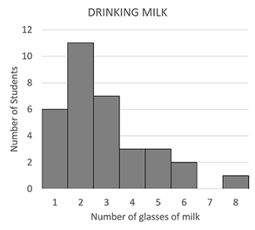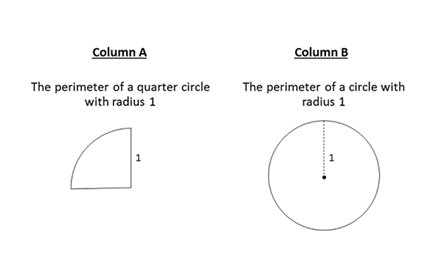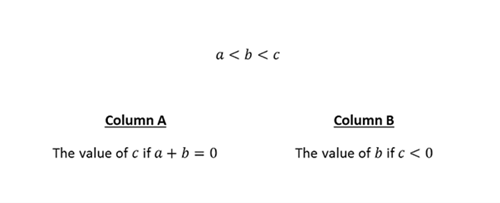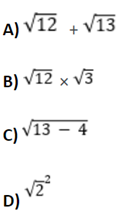Boost Your Chances of Getting Into a Top Private School
Doing well on the ISEE can make all the difference when applying to a competitive private or independent school. It’s not just about scoring high—it's about standing out. And the best way to start? Try real sample questions first.
On this page, you’ll find free ISEE practice questions for both the Middle and Upper Levels. They’re designed to help you understand exactly what’s on the test—and how to think like a top scorer. Before you invest in full test prep, explore our expertly written practice questions across Verbal Reasoning, Quantitative Reasoning, Reading Comprehension, Math Achievement, and Essay.
Why start with samples?
Because practice is the bridge between anxiety and confidence. By answering real ISEE-style questions, you’ll know exactly where your strengths are—and what you need to work on next.
Practice the ISEE with Sample Questions
The sample questions are presented in the order they appear on the ISEE exam. Each section will include four sample questions, divided both by level and sub-topic as indicated. We recommend viewing all the questions, even if you are only interested in one of the levels offered.
This will provide more familiarity with the types of questions asked on the ISEE test, even if they are not all at the exact level you will face. This will give you a solid understanding of the types of questions that will be asked on the ISEE exam and improve your understanding before taking an ISEE practice test.
ISEE Verbal Reasoning Sample Questions
The first section of the ISEE test is the Verbal Reasoning section, which consists of two types of questions: - Synonyms and Sentence Completion. The synonym questions provide a word and then list four choices from which to identify the synonym. Sentence Completion questions present a sentence with one or two words missing, and there are four choices of words to use in the spaces provided to complete the sentence. You have 20 minutes to complete this section.
Try the Verbal Reasoning practice tests for Middle Level. For those seeking a more rigorous challenge, the Upper Level practice tests for Verbal Reasoning.
Question 1: Verbal Reasoning: Synonyms – Middle Level
Identify the synonym:
NIMBLE
TestPrep-Online Tutor's Tip:
"When I teach synonym questions, I encourage students to make flashcards with synonyms and antonyms—for example, "nimble" and "agile" on one side and "clumsy" on the other. Grouping words by meaning helps make vocabulary stick. Try using color-coded cards or a matching game to turn review time into a fun activity!"
Question 2: Verbal Reasoning: Synonyms – Upper Level
Identify the synonym:
VERBOSE
TestPrep-Online Tutor's Tip:
"To master tough vocabulary like this, I always tell my students: connect the new word to something real. Make a personal link or a visual—maybe a cartoon character who talks way too much. Then write the word, a quick definition, and a sentence of your own on a flashcard. Review a few cards each day and test yourself. You'll be surprised how fast your vocab grows when you study in small, creative chunks!"
Get the Middle Level ISEE PrepPack (6-Month Access)
- Full-length practice tests
- Detailed explanations
- Vocabulary + math drills
- Everything your child needs to improve
Get the Upper Level ISEE PrepPack (6-Month Access)
- Advanced practice questions
- 2 full simulations
- Essay writing tips and models
- Track your progress
Question 3: Verbal Reasoning: Sentence Completion – Middle Level
Complete the sentence:
Sculptor Andy Goldsworthy explains that though challenging, he is _____ to work with transient materials like leaves and petals out of a responsibility to work with nature.
TestPrep-Online Tutor's Tip:
"When I teach sentence completion, I tell students to look for emotional or logical clues in the sentence. In this one, the words "though challenging" and "out of a responsibility" tell you he doesn’t find it easy, but he still feels he must do it. That’s the feeling behind "compelled." Try making flashcards for words like compelled, motivated, driven, and forced—and match them with their antonyms like lazy or indifferent. Grouping them this way helps your brain make strong connections."
Question 4: Verbal Reasoning: Sentence Completion – Upper Level
Complete the sentence:
The first step in selling a publication is making sure you find a(n) _____ distributor to stock and _____ the books to the appropriate stores.
TestPrep-Online Tutor's Tip:
"For two-blank questions, I teach my students to plug in just the first blank and eliminate choices that don’t work before moving to the second. This helps cut down confusion. Also, build your vocab bank with category-based flashcards. For example, make one for "business and logistics" and include words like adequate, competent, distributor, and deliver. Review these by writing your own mini-sentences—it helps lock in meaning and usage."
The above examples should provide a general idea of what the Verbal Reasoning section looks like for each question type in the Middle and Upper levels.
If you are looking for additional Verbal Reasoning practice questions, try one of our full PrepPacks below!
This section of the ISEE has 40 questions. Our PrepPacks include two full simulations of the test, for a total of 80 Verbal Reasoning questions, providing you with everything you need to master this section.
ISEE Quantitative Reasoning Sample Questions
The next section of the ISEE is Quantitative Reasoning, which consists of math word problems and quantitative comparisons. The word problems are linked to the NCMT Standards. They are generally designed to be solved primarily through logical reasoning rather than computation. The comparison problems simply ask you to determine which of two expressions is greater in value, if they are equal, or if there is not enough information to determine. You have 35 minutes to complete this section.
Challenge yourself with the Quantitative Reasoning practice tests for the Middle Level ISEE Test, or push your skills further with the more rigorous Upper Level Quantitative Reasoning ISEE practice tests.
Question 5: Quantitative Reasoning: Word Problems – Middle Level
Mr. Collins asked his students to write down the number of glasses of milk each of them drink in a week. The bar graph below represents that data:

If a new student who drinks 7 glasses of milk in a week would join Mr. Collins class, what would happen to the range of the data?
TestPrep-Online Tutor's Tip:
"When working with data sets, I always remind my students: The range only changes if a new number is smaller than your current smallest number or bigger than your biggest number. Make it a habit to check your highest and lowest values before you even look at the answer choices. Try building a "range tracker" chart with practice problems to get quick at spotting changes."
Question 6: Quantitative Reasoning: Word Problems – Upper Level
The Special Car Company manufactures 𝑓 cars per day. On Mondays and Tuesdays, they produce three fewer cars than they do on the other days, due to repair work done on used cars. The company operates five days a week. Which of the following expressions can be used to model the total number of cars manufactured per week?
TestPrep-Online Tutor's Tip:
"Always read carefully for exceptions to a pattern. A lot of math word problems will trick you with "except on" or "only when." I teach my students to underline these exceptions right away. Then build your equation step by step. Try practicing problems where you write your own story and expression—it's a powerful way to master math modeling."
Question 7: Quantitative Reasoning: Quantitative Comparisons – Middle Level

TestPrep-Online Tutor's Tip:
"When solving comparison problems, you often don’t need the exact answer—just which is bigger. I teach my students to sketch the situation if there’s a shape and estimate with logic first. Save full calculations for when you really need them. The more you practice estimating, the faster you’ll spot which side is greater."
Question 8: Quantitative Reasoning: Quantitative Comparisons – Upper Level

TestPrep-Online Tutor's Tip:
"For algebraic comparison questions, plug in numbers that follow the rules. I call it the "smart trial method." Choose values that make the conditions true and test both columns. Just be sure to follow every clue the problem gives. Practicing this method will help you see patterns much faster on test day."
Now that you understand what the Quantitative Reasoning section looks like, having seen examples of both word problems and quantitative comparisons, we are ready to move on to the next section, which takes on a different format of assessment.
We invite you to practice a variety of questions like the ones above in one of our full PrepPacks linked below!
The ISEE test contains 37 Quantitative Reasoning questions. Our PrepPacks include two full practice tests, amounting to over 70 Quantitative Reasoning questions, and much more.
ISEE Reading Comprehension Sample Questions
Next on the ISEE test is the Reading Comprehension section, which tests students' ability to comprehend and analyze texts. Instead of stand-alone questions, the test now presents six passages, each accompanied by six questions designed to assess your ability to understand the content of the text, identify central themes, draw conclusions, and more. You have 35 minutes to complete this section.
Enhance your skills with the Reading Comprehension practice tests for the ISEE Middle Level, or take on a tougher challenge with the Upper Level Reading Comprehension practice tests.
Question 9: Reading Comprehension – Middle Level
Read the paragraph and answer the two following questions:
In the wild, packs of animals are usually arranged in a strict hierarchy. In most animal species, the young are in the lower levels, followed by the females, while the males are highest up. Yet, within the males there are also ranks. For instance, when observing a pride of lions, it promptly becomes clear that one male is feared by all the others. Furthermore, among the other males in the group, there are ones considered “higher up” and ones that are lower in rank. The leading male of a pack is referred to as the alpha male, and it may be followed by males ranked as beta, gamma, then omega. The higher up the hierarchy an animal is located, the more privileges it has.
The main purpose of the paragraph is to explain...
TestPrep-Online Tutor's Tip:
"When I'm looking for the main purpose, I ask myself: "What is this paragraph really about from start to finish?" I ignore the specific examples and details, and focus on the big picture theme that connects everything together. If I can't find that theme mentioned in multiple sentences, it's probably not the main purpose."
Question 10: Reading Comprehension – Middle Level
In the fourth sentence, the word "pride" most nearly means...
TestPrep-Online Tutor's Tip:
"For vocabulary questions, I always try substituting each answer choice back into the original sentence to see which one makes the most sense. I also look at the surrounding sentences for clues about what the word should mean in this specific context."
Question 11: Reading Comprehension – Upper Level
Read the paragraph and answer the two following questions:
In the Tanzanian village of Liyasongoro, located 1,700 meters up the south slope of Mount Kilimanjaro, Wilbert Minja has lived for more than 60 years, and lately he has been worried. The weather is all wrong, he says: "Rain falls when it should not and does not come when it should." He recites stories describing how new settlers used to flock to the mountainside, lured by its rich soil and abundant fresh water. Now, he says, they are abandoning their failed homesteads. The mountain streams are running dry, and the dusty ground that was once fertile and full of life has turned barren.
Which of the following statements cannot be concluded from the passage?
TestPrep-Online Tutor's Tip:
"For "cannot be concluded" questions, I'm looking for the answer that goes beyond what the passage actually says. The passage might give me information about one specific place or situation, but that doesn't mean I can apply it to everywhere similar. I need to stick to exactly what the text tells me."
Question 12: Reading Comprehension – Upper Level
The writer most likely states how long Wilbert Minja has been living in Liyasongoro in order to...
TestPrep-Online Tutor's Tip:
"When an author includes a specific detail like "60 years," I ask myself: "Why does this detail matter for the main point?" Usually these details are included to support or strengthen the author's argument. In this case, the main point is that the weather has changed, so the 60 years proves Wilbert would know if it really has changed.!"
The samples above should give you a general feel for the Reading Comprehension section.
If you want to see more and practice reading and analyzing passages like the ones that will appear on the test, just click below!
The ISEE Reading Comprehension section contains 36 questions, and our detailed prep pack includes over 70 practice questions divided into two full-length simulations.
ISEE Mathematics Achievement Sample Questions
We've now reached the Math Achievement section, the final problem-solving topic on the ISEE. This section consists entirely of mathematical word problems. Unlike the Quantitative Reasoning section, this section is designed to test your knowledge and skills in mathematical concepts that you learned in school, so a broader understanding of the concepts is required. The problems cover many math topics, focusing on algebra, geometry, probability, and measurement. You have 40 minutes to complete this section.
Boost your abilities with the Math practice tests for the ISEE Middle Level, or push yourself further with the more challenging Upper Level ISEE Math practice tests.
Question 13: Mathematics Achievement - geometry/measurements - Middle Level
A tennis player is standing 2 meters away from a net whose height is one meter, as shown in the diagram.

From what height does the tennis player need to hit the ball, for it to just pass over the net and land 4 meters away from the net?
Try this tip for geometry questions:
For similar triangles, I always identify the two triangles first, then set up my proportion carefully. I make sure I'm comparing the same types of measurements (horizontal to horizontal, vertical to vertical). Drawing a quick sketch really helps me visualize what's happening and avoid mix-ups.
Question 14: Mathematics Achievement - data/probability – Middle Level
Ran rolled two six-sided dice one after the other. Which of the following probabilities equals 1/6?
TestPrep-Online Tutor's Tip:
"When I see "same number" or "matching" in probability problems, I use this trick: let the first event happen freely (probability = 1), then figure out what needs to happen next to get the match. This is much easier than trying to count all the matching pairs like (1,1), (2,2), etc. It's the same answer but with less work!"
Question 15: Mathematics Achievement - square roots/integers – Upper Level
Which numerical expression does not represent an integer?

TestPrep-Online Tutor's Tip:
"With square root problems, I always look for perfect squares hiding inside first (like √12 = 2√3). For multiplication, I can combine under one radical. For addition/subtraction of different square roots, they rarely simplify to integers. I evaluate each option systematically rather than trying to guess."
Question 16: Mathematics Achievement - algebra/graph plotting – Upper Level
Which graph represents the solution set for the inequality 𝑦 ≥ |𝑥|?
TestPrep-Online Tutor's Tip:
"For graphing absolute value inequalities, I follow these steps: (1) Graph the basic y = |x| shape (always a V opening up), (2) Check the inequality direction - "≥" means shade above, "≤" means shade below, (3) Make sure the boundary line is solid (for ≥ or ≤) or dashed (for > or <). The absolute value always creates that distinctive V-shape!"
This concludes all of the standard sample questions on this page, leaving only the essay to explore.
For more practice, check out the Mathematics Achievement section and all the others in one of the packs below.
The ISEE Mathematics Achievement section contains 47 questions. Our comprehensive preparation includes two full tests of this size, supplying you with 90+ math word problems to get you ready and stress-free come testing day.
ISEE Essay
After all of these sections are completed, there is one final part of the ISEE-the essay. You will be given a short question to which you are expected to write an essay in response. It is not graded, but it is meant to make an impression on the people who read it. This is your opportunity to demonstrate your writing and communication skills to the administrators of the program you are applying to, to express your individuality, and to prove to them that you are not to be overlooked. You will have 30 minutes to plan and write your essay.
Here are two sample essay prompts to give you an idea of the types of questions you might be asked:
- Of all the things you have done in your life, what are you most proud of and why?
- If you could spend a day anywhere in the world, where would you go and with whom?
You can use these prompts to practice essay writing or just to brainstorm ideas; for additional essay writing tips, please visit the ISEE Essay page. On this page, you will find detailed teacher curated tips so you can refine your essay writing skills with our expert guidelines and practice prompts.
Practice the ISEE Test With Sample Questions
Preparing for the ISEE will give you a much better shot at showing your potential and getting accepted to your school or program of choice. If you are unfamiliar with the types of questions asked and what they are looking to assess, you put yourself at a disadvantage in showing what you are capable of. The more sample questions you attempt, the more comfortable you will become answering questions in this format, and this will allow you more time and a clearer mind to focus on your answers and avoid careless mistakes and running out of time to answer. Additionally, the more you practice, the more relevant information you will review, and the better you will remember all of the concepts, formulas, rules, and information required to succeed on the test.
ISEE Test Registration & Dates
Students have the opportunity to enroll for a test date during the following periods: Fall (August-November), Winter (December-March), and Spring/Summer (April-July). It is important to note that registration for testing sessions will cease precisely two weeks before the scheduled testing date. This ensures that students have ample time to plan and prepare accordingly, allowing them to make informed decisions about the timing of their registration and avoid missing out on any testing opportunities.
To take the test you are required to pay a fee 110$-210$ depending on which testing option you choose. For more information on ISEE test dates and registration, Click Here.
What is the ISEE Test?
Watch the following video to learn everything you need to know about the ISEE test and how to score high on it. Understand the structure and format of the ISEE, try sample questions, and get important tips for acing this test.
Family Membership - Best Value!
Prefer to prep for multiple levels or have more than one child?
Try our Family Membership with 12 months of unlimited access to all PrepPacks and question banks!
ISEE FAQ: Frequently Asked Questions
The ISEE (Independent School Entrance Exam) is one of the most widely used entrance tests for private and independent schools. Admissions teams use it to assess academic readiness, critical thinking, and reasoning skills. A strong ISEE score can significantly improve your child’s chances of getting into a top-tier school—especially when applications are competitive.
There are four levels:
- Primary Level: Grades 2–4
- Lower Level: Grades 5–6
- Middle Level: Grades 7–8
- Upper Level: Grades 9–12
This page focuses on Middle and Upper Levels, which are the most critical for selective school admissions.
Each PrepPack includes:
- 2 full-length practice tests (per section)
- Hundreds of realistic practice questions
- Answer explanations written by expert tutors
- Vocabulary builders, math skill drills, and essay prompts
- A user-friendly interface for online learning
- 6 months of access with any single-level pack
For families prepping multiple children or levels, our Family Membership includes 12 months of unlimited access to all grade levels
Yes. Every sample on this page was written by certified educators and test prep experts to reflect the structure, tone, and difficulty of real ISEE questions. We base our practice material on publicly available ISEE guidelines and feedback from thousands of students who have used our materials.
We specialize in test prep for private school admissions. With thousands of happy families, our platform offers:
Instant online access
Expert-created content
A flexible, affordable alternative to expensive tutoring
Clear explanations that help both students and parents understand the material
Plus, you can start for free with sample questions—then upgrade only when you’re ready.


 =
= = 3.
= 3. ×
× =
= =
= = 6.
= 6. = 2.
= 2. +
+ ≠
≠ .
. and
and , when solved, each result in decimals (and irrational numbers) and when added together remain decimals (and irrational numbers). Therefore, (A) is not an integer, so it is the correct answer.
, when solved, each result in decimals (and irrational numbers) and when added together remain decimals (and irrational numbers). Therefore, (A) is not an integer, so it is the correct answer. 

